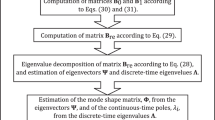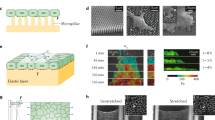Abstract
THE existing methods for measuring mechanical stresses due to vibrations are (with few exceptions, applicable only in special cases) dependent upon special devices clamped to the structure to be examined. For the purpose of measuring stresses duo to impact near to the point of impact these methods are generally useless, as the measuring device then makes movements relative to the structure, so introducing errors in the stress record. These errors were examined by me in the case of two stress-recorders of the latest types and were found to be of such serious magnitudes that I had to abstain from using this kind of apparatus in my previous investigations1.
This is a preview of subscription content, access via your institution
Access options
Subscribe to this journal
Receive 51 print issues and online access
$199.00 per year
only $3.90 per issue
Buy this article
- Purchase on Springer Link
- Instant access to full article PDF
Prices may be subject to local taxes which are calculated during checkout
Similar content being viewed by others
References
A. Bloch, Zur Mechanik des Hemmschuh—Stosses und verwandter Vorgänge des Eisenbahnbetriebes. (Dissertation, Technische Hoch-schule, München. 1933).
Author information
Authors and Affiliations
Rights and permissions
About this article
Cite this article
BLOCH, A. New Methods for Measuring Mechanical Stresses at Higher Frequencies. Nature 136, 223–224 (1935). https://doi.org/10.1038/136223b0
Issue Date:
DOI: https://doi.org/10.1038/136223b0
This article is cited by
-
Identification of resonant frequencies of rotating beams with the use of PZT crystals
Experimental Mechanics (1979)
Comments
By submitting a comment you agree to abide by our Terms and Community Guidelines. If you find something abusive or that does not comply with our terms or guidelines please flag it as inappropriate.



